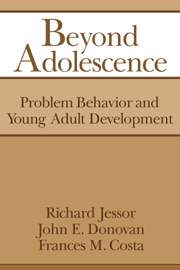1 - Introduction
Published online by Cambridge University Press: 07 October 2009
Summary
Young lives growing and changing and moving through time are among the most elusive and refractory of all objects of scientific inquiry. Yet, that is what this book is about. Of course, it is about other things as well, such as testing further the adequacy of a psychosocial theory, and reexamining the structure of problem behavior. But, at its core, it is about human development from adolescence and youth to well into young adulthood.
The difficulties of the longitudinal study of lives are well known, and the litany of its vicissitudes is all too familiar. One author takes note of the “widespread pessimism regarding the feasibility of such studies” and goes on to draw the analogy with efforts at international disarmament: “Too often, both sets of endeavors are undertaken by dreamers” (Vaillant, 1984, p. 61). Nevertheless, many investigators (that author included) continue to pursue that mode of inquiry, not out of foolhardiness but out of a keen sense of the unique vantage it provides on questions that cannot be addressed by other approaches. Understanding the integrity of the life course, tracing its continuity over large segments of time, distinguishing what is ephemeral from what is lasting, grasping the role that the past plays in shaping the future – all these, and more, are issues that yield only to research that is longitudinal or developmental in design.
- Type
- Chapter
- Information
- Beyond AdolescenceProblem Behaviour and Young Adult Development, pp. 3 - 16Publisher: Cambridge University PressPrint publication year: 1992



